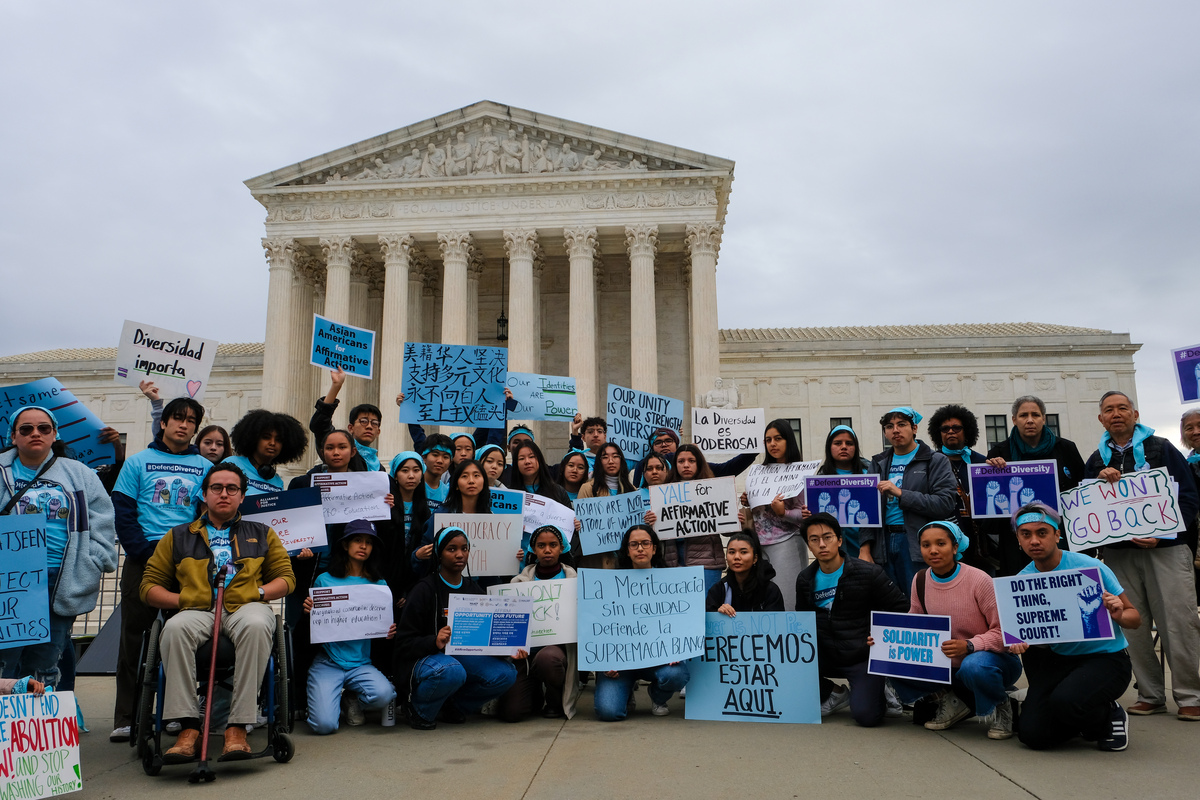Yale students, faculty grapple with ethics of affirmative action
In the midst of a nationwide conversation and university legal involvement in the debate surrounding affirmative action in college admissions, Yale’s cultural centers fostered dialogues in anticipation of June’s Supreme Court ruling on the matter.

Rachel Shin, Contributing Photographer
In 2014, Students for Fair Admissions sued Harvard University and the University of North Carolina, alleging that their race-conscious admissions policies constituted discrimination against white and Asian applicants.
Affirmative action policies in college admisisons have faced mounting criticism and legal challenges. Yale community members — from cultural center deans to current students to University president Peter Salovey — offered their opinions in response to the court battles that have shaped the debate over the last several years.
While the Supreme Court cases under scrutiny primarily involve Harvard and the University of North Carolina, the outcomes hold implications that extend beyond these specific institutions, potentially impacting educational institutions nationwide. The collaborative effort behind this brief underscores the broader importance and potential ramifications of the impending Supreme Court decisions.
In November 2022, 41 Yale students representing various cultural activist groups within the University gathered with students from at least four other colleges and universities on the steps of the Supreme Court to protest while the justices heard arguments for the two cases.
Legal experts speculated that the conservative majority on the Supreme Court will likely rule against affirmative action in both cases, with a decision expected in late May or June 2023.
“Following the oral arguments, it seems all but decided that affirmative action will fall next year,” wrote Tony Ruan ’25, the co-political chair of Yale’s Asian American Students Alliance. “While obviously frustrated, and a little hoarse from a bit of vocal strain, I also feel a profound sense of pride and gratitude for our community.”
Yale took proactive measures in September 2022 to support the preservation of race-conscious admissions policies, anticipating a critical Supreme Court ruling that could shape the future of affirmative action.
Alongside other prestigious institutions, Yale submitted its own joint amicus brief in August, offering its endorsement of affirmative action. Amicus briefs, filed by parties with a vested interest in the outcome of a given case, have the potential to influence the Court’s decision. In the 2003 Grutter v. Bollinger case, for example, amicus briefs by military and business groups were instrumental in supporting affirmative action at the University of Michigan.
“Diversity fosters a more robust spirit of free inquiry and encourages dialogue that sparks new insights,” the Yale joint brief reads. “Diversity encourages students to question their own assumptions, to test received truths and to appreciate the complexity of the modern world.”
In February 2019, Yale’s cultural centers hosted an event titled “Facts Not Fiction: Affirmative Action, College Access, and Diversity” in response to the ongoing investigation by the Department of Justice into Yale’s and Harvard’s admissions policies, specifically regarding alleged discrimination against Asian American applicants. The event aimed to address the topic of how race and other factors influence college admissions.
During the event, Professor OiYan Poon, the director of the Race and Intersectional Students for Educational Equity Center at Colorado State University, gave a lecture on the history of affirmative action.
In addition to the lecture, the event featured a mock admissions workshop, allowing participants to step into the shoes of admissions officers and make decisions about the admission of fictional students.
According to Esther Reyes ’21, a participant at the lecture, gaining knowledge about the intricacies of the admissions process and observing the misconceptions surrounding it has aided her comprehension of why affirmative action generates such controversy. She expressed that “hearing an Asian woman” talk about a topic that is “big in the Asian American community definitely illuminated a lot of things.”
“The reason we decided to host this event jointly as the cultural centers is because we really felt that there needed to be a holistic conversation around admissions and recognizing that there is a lot of misinformation and a lot of myths that we grew up understanding about how affirmative action works as it relates to admissions,” said AACC Dean Joliana Yee.
Yee expressed hope that these conversations would encourage a better understanding of the subject.
Poon, along with 531 other scholars specializing in college access, Asian American studies and race, also submitted an amicus brief in support of Harvard’s admissions practices. The brief, filed in August, utilized the authors’ original research and expertise related to the legal aspects of the case.
The brief argues that Harvard’s whole-person review process benefits Asian American applicants and aims to debunk the claims made by Students for Fair Admissions, the organization suing Harvard for alleged discriminatory admissions practices. It also asserts that the arguments put forth by Students for Fair Admissions are based on racial stereotypes and myths about Asian Americans, according to information provided on the Asian American Civil Rights website.
Following this tradition of campus teach-ins and educational events, other Yale students who remained in New Haven during the November hearings spearheaded various on-campus initiatives, such as distributing informational flyers and hosting workshops.
Currently, four out of the nine justices currently serving on the Supreme Court are graduates of Yale Law School.






